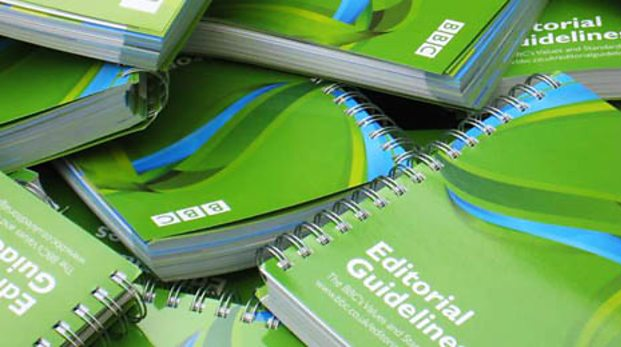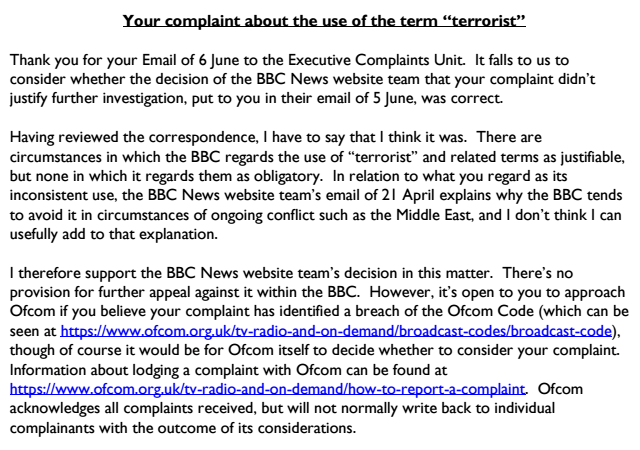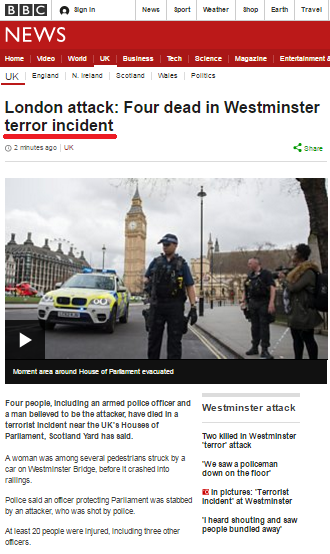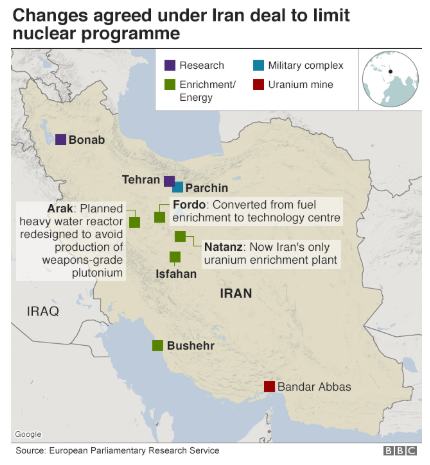An issue which many members of the public find objectionable and offensive is the fact that while the BBC consistently refuses to use the word terror in its reports on violent attacks against Israelis, its reports on comparable attacks in other locations (especially Europe and North America) do use such language.
Back in April we noted a reply received from the BBC Complaints Unit by a member of the public who had submitted a Stage 1a complaint concerning that double standard in the language employed when reporting terrorism.
“Thank you for getting in touch about our report on the attack carried out on Westminster Bridge in London and please accept our apologies for the delay in our response.
The BBC sets out clear parameters on how terms such as “terrorist” might be used:
http://www.bbc.co.uk/editorialguidelines/guidance/terrorism-language/guidance-full
Where there is an ongoing geopolitical conflict – as in the Middle East – to use the term “terror attack” or similar might be seen to be taking sides. There are those who might consider the actions of the Israeli government to be considered as terrorist acts.
In a situation where a country that is not involved in a direct physical combat comes under attack, it may be reasonable to construe that as a terrorist incident.
The use of such terminology is never an exact science but where a continuing conflict exists, it is reasonable that the BBC would not wish to appear to be taking sides.”
Unsatisfied with that response, the complainant submitted a stage 1b complaint which was also rejected. Mr Turner then approached the BBC’s Executive Complaints Unit (ECU) which similarly rejected the complaint.

Using the system which came into effect in April, Mr Turner then approached OFCOM which ruled that the issue he raised is not “substantive”.
“Thank you for contacting us about material published on the BBC’s website, specifically the headlines ‘London attack: Four dead in Westminster terror attack’ and ‘Jerusalem lorry attack: Four Israeli soldiers killed’.
I understand that you are not satisfied with the final response you have received from the BBC’s Executive Complaints Unit and have referred your complaint to Ofcom for its opinion.
All complaints received by Ofcom are assessed to see if they raise a significant issue which should be considered further. Not all complaints will be pursued by Ofcom. Further information about Ofcom’s role and how we consider BBC online material complaints under our procedures is available on our website: https://www.ofcom.org.uk/consultations-and-statements/ofcom-and-the-bbc/bbc-online-material
We have carefully reviewed the material you are concerned about, your complaint and the BBC’s final response to you on it.
Ofcom considers that your complaint does not raise a substantive issue under the BBC’s Editorial Guidelines that requires our further consideration. We will therefore not be pursuing your complaint.”
Mr Turner wrote back to OFCOM’s Standards Team ask for an explanation of the rationale underpinning that ruling and received a reply including the following:
“Ofcom has considered your complaint and the BBC’s response to it, and our view is that this matter does not raise a substantive issue under the relevant editorial guidelines and therefore does not warrant further consideration by Ofcom.
The BBC’s response clearly sets out its editorial policy on Terrorism: Language when Reporting Terrorism. In our view the use of the term “terror attack” in the headline of the article relating to the incident in Westminster does not meet the threshold of being a substantive issue that requires further consideration by Ofcom because the body of the article makes clear that the Prime Minister had declared the attacker to be a “terrorist” and the matter was being dealt with by counter-terrorism police. Furthermore, the BBC’s Stage 1a response clearly sets out the reasons why they may report incidents like these differently in different contexts.”
Mr Turner then wrote back again, pointing out the many discrepancies in the BBC’s Stage 1a response that was deemed acceptable by OFCOM.
“In your response you stated that the BBC’s use of the term terrorism to describe the attack in London was legitimate because the UK authorities had used that term […]
However, the Israeli government also uses such terminology when attacks take place in Israel but in those cases the BBC does not describe the incidents as ‘terrorism’ in its own words.
The BBC’s editorial guidelines on ‘language when reporting terrorism’ clearly state that:
“When we do use the term we should strive to do so with consistency in the stories we report across all our services and in a way that does not undermine our reputation for objectivity and accuracy.” […]
Hence, if the BBC is going to use the word terror on the basis that officials in one country have described the incident as such, consistency demands that such a policy should obviously also apply in other countries.
Moreover, in the past the BBC has justified its use of the word terrorists to describe Jewish attackers using precisely the same argument:
However, Palestinian or Arab perpetrators are never described in those terms: a clear consistency failure.
You also stated that:
“…the BBC’s Stage 1a response clearly sets out the reasons why they may report incidents like these differently in different contexts.”
However, those ‘reasons’ do not hold water: UK forces are involved in the military campaign against ISIS jihadists in Iraq and Syria and the London terrorists cited that involvement as a motive for their attacks. Additionally, as noted above, the BBC did use the term ‘Jewish terrorists’ to describe the perpetrator/s of the arson attack in Duma, despite the existence of an “ongoing geopolitical conflict”.
The argument that if a person commits an act of violence against civilians with the purpose of furthering a political or religious agenda in a country in which there is “an ongoing geopolitical conflict”, that is not terrorism but if he does the exact same in a country where there is no such ongoing conflict, it is, is obviously flawed. Terrorism is a means – regardless of the ends it aims to achieve.
The BBC’s inconsistency on the use of the word terror shows that the corporation’s basic approach to the topic does not distinguish between method and aims, means and ends. The result of that is that the description of the means is adjusted according to the perceived cause.
Until BBC editors do indeed begin to separate the means from the ends, it will of course be impossible for the corporation to present a consistent, uniform approach to the subject of terrorism, to adhere to editorial standards of accuracy and impartiality and to fulfil its purpose to educate and inform.
I find it disturbing that OFCOM would not consider that to be “a substantive issue that requires further consideration”. Might I respectfully request, on the basis of the above points, that you reconsider this appeal, otherwise we allow the BBC to display a clear double standard in its reporting on terrorism: one in Israel – and a quite different policy anywhere else in the world – in breach of its own editorial guidelines.”
OFCOM’s reply to that letter included the following:
“Following the further points you made, we have looked into this matter again. However, it remains our view that your complaint about the articles headlined ‘London attack: Four dead in Westminster terror attack’ and ‘Jerusalem lorry attack: Four Israeli soldiers killed’ does not raise a substantive issue that requires further consideration, and this is our final response in relation to this complaint.”
So as we see, the double standards repeatedly evident in the language used by the BBC when reporting on terrorism in Israel and in other locations now have the OFCOM rubber stamp.




